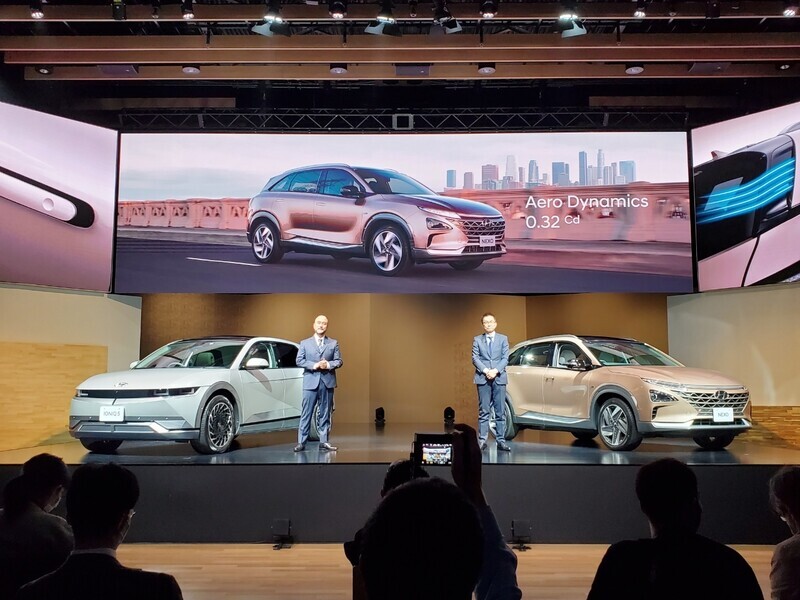hankyoreh
Links to other country sites 다른 나라 사이트 링크
Hyundai Motor dips toe back into Japanese market after 12 years

Hyundai Motor is returning to the Japanese market after a 12-year absence.
The automaker originally entered the market in 2001, only to eventually pull out in late 2009 after dismal sales. Now it has set the goal of resuming sales online before eventually establishing an offline base.
Its strategy is to secure an early advantage in the eco-friendly vehicle market with its Nexo hydrogen fuel cell vehicle and Ioniq 5 electric vehicle, amid predictions that eco-friendly vehicle demand and infrastructure in Japan are set to rapidly grow.
Hyundai Motor announced its planned venture at a press talk Tuesday at the Otemachi Mitsui Hall in Tokyo. This will be the first time it has attempted to tackle the Japanese market since its earlier withdrawal.
In the intervening years, Hyundai Motor’s sales in Japan have been exclusively in buses and other commercial vehicles.
The move is being kicked off with the Nexo and Ioniq 5. Shigeaki Kato, managing director for Hyundai Mobility Japan, explained that the company was “scheduled to begin taking orders [for the two vehicles] in May of this year and begin delivering them in July.”
The prices have been set at 4,790,000 yen for the Ioniq 5 and 7,768,300 yen for the Nexo — roughly US$41,000 and US$67,000, respectively. The plan is to increase the number of eco-friendly models for sale in response to future developments in the market situation.
Hyundai Motor’s surprise decision to reenter the Japanese market now — after previously taking the time to judge when to tackle the challenge again — was prompted by predictions that eco-friendly vehicle demand there is set to grow rapidly.
“One key theme in lifestyle-related changes has been the ‘post-carbon’ shift as a means of addressing global warming and environmental issues,” said Hyundai Motor CEO Chang Jae-hoon, who attended the press talk virtually.
“Japan, in particular, is a market where there is a growing post-carbon consciousness,” he noted.
In comparison with other countries, the Japanese electric vehicle market is still relatively small. EV sales in 2020 amounted to over one million vehicles in China, 720,000 in Europe, and 250,000 in the US; in contrast, just 14,604 were sold in Japan.
EVs still account for just 0.003% of all vehicle sales in Japan. In the past, Japanese finished automobile makers have focused more on hybrid vehicles than EVs.
But now even those companies are looking to shift gears.
Late last year, Toyota, the world’s top-ranked automaker, announced the target of launching 30 models of battery electric vehicles (BEVs) by 2030. It also said it would be investing 8 trillion yen in the effort.
Previously, the Japanese government stated plans to have eco-friendly vehicles account for 100% of new automobile sales by 2035.
As a result, analysts are predicting that Japanese EV infrastructure will also start growing rapidly. The Japanese government plans to increase the number of EV charging stations from just 29,200 as of March 2021 to 150,000 by 2030.
For now, Hyundai Motor will be selling the Nexo and Ioniq 5 online. Through its website and mobile app, it will be providing one-stop service for everything from vehicle searches to payment and delivery.
Offline, it will be providing brand experiences, purchasing support, servicing, and education through so-called customer experience centers. The first center is set to open in Yokohama in the second half of 2022, with others to be established later on in major regions of Japan.
Hyundai Motor is also providing car-sharing services in partnership with the local car-sharing company DeNA SOMPO Mobility.
Chang explained that Hyundai “wants to help achieve carbon neutrality with zero-emission vehicles such as fuel cell vehicles and EVs in the Japanese market.”
“Hyundai Motor has continued exploring various avenues over the past 12 years. Now we’ve decided to go back to basics and approach customers with sincerity,” he said.
By Ahn Tae-ho, staff reporter
Please direct questions or comments to [english@hani.co.kr]

Editorial・opinion
![[Column] The state is back — but is it in business? [Column] The state is back — but is it in business?](https://flexible.img.hani.co.kr/flexible/normal/500/300/imgdb/original/2024/0506/8217149564092725.jpg) [Column] The state is back — but is it in business?
[Column] The state is back — but is it in business?![[Column] Life on our Trisolaris [Column] Life on our Trisolaris](https://flexible.img.hani.co.kr/flexible/normal/500/300/imgdb/original/2024/0505/4817148682278544.jpg) [Column] Life on our Trisolaris
[Column] Life on our Trisolaris- [Editorial] Penalties for airing allegations against Korea’s first lady endanger free press
- [Editorial] Yoon must halt procurement of SM-3 interceptor missiles
- [Guest essay] Maybe Korea’s rapid population decline is an opportunity, not a crisis
- [Column] Can Yoon steer diplomacy with Russia, China back on track?
- [Column] Season 2 of special prosecutor probe may be coming to Korea soon
- [Column] Park Geun-hye déjà vu in Yoon Suk-yeol
- [Editorial] New weight of N. Korea’s nuclear threats makes dialogue all the more urgent
- [Guest essay] The real reason Korea’s new right wants to dub Rhee a founding father
Most viewed articles
- 1[Column] Why Korea’s hard right is fated to lose
- 2Amid US-China clash, Korea must remember its failures in the 19th century, advises scholar
- 3[Column] The state is back — but is it in business?
- 4[Column] Life on our Trisolaris
- 5[Guest essay] Maybe Korea’s rapid population decline is an opportunity, not a crisis
- 6OECD upgrades Korea’s growth forecast from 2.2% to 2.6%
- 7AI is catching up with humans at a ‘shocking’ rate
- 8[Column] Can Yoon steer diplomacy with Russia, China back on track?
- 9[Editorial] Yoon must halt procurement of SM-3 interceptor missiles
- 1060% of young Koreans see no need to have kids after marriage